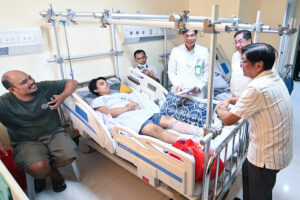PRESIDENT Ferdinand R. Marcos, Jr. on Tuesday said the government’s “zero-balance billing” program in public hospitals is progressing smoothly, with thousands of Filipinos already benefiting since its launch after his fourth State of the Nation Address (SONA) in July.
During an inspection at East Avenue Medical Center in Quezon City, Mr. Marcos said the initiative, which guarantees patients no out-of-pocket expenses for covered medical services, is now in place in 83 state-run health facilities nationwide.
“I’m happy to report that the zero-billing program is proceeding well,” the President said in Filipino, based on a Palace video streamed live on YouTube. “Of course, at the start, there has to be an information drive, not only in hospitals but also for patients, and I think we are succeeding in that.”
The program’s rollout comes as the country continues to struggle with inequitable access to healthcare, congested government hospitals and steep medical costs that often drive families into debt.
Despite expanded Philippine Health Insurance Corp. (PhilHealth) coverage and investments in universal healthcare, funding gaps, staffing shortages and uneven services across regions remain key challenges.
Health Secretary Teodoro J. Herbosa said at the event more than 12,000 patients in Eastern Visayas alone have availed themselves of the program, while East Avenue Medical Center has recorded almost 2,900 beneficiaries since implementation began.
Mr. Marcos said success depends on hospitals and patients fully understanding the system. He said staff have been trained to ensure that eligible patients consistently receive zero-balance billing. He also cited the role of word of mouth in spreading awareness.
He urged continued awareness campaigns to encourage more Filipinos to seek treatment without fear of high medical costs.
The President also paid tribute to healthcare workers, recalling their sacrifices during the COVID-19 pandemic and commending their continued service beyond duty hours.
Funding for the program is drawn from the Medical Assistance to Indigent and Financially Incapacitated Patients, Philippine Charity Sweepstakes Office (PCSO), Philippine Amusement and Gaming Corp. (Pagcor), as well as allocations to Department of Health hospitals. PhilHealth provides additional financial support.
The administration has positioned the program as a cornerstone of its efforts to strengthen universal healthcare and ease the financial burden of hospitalization for millions of Filipinos. — Chloe Mari A. Hufana

